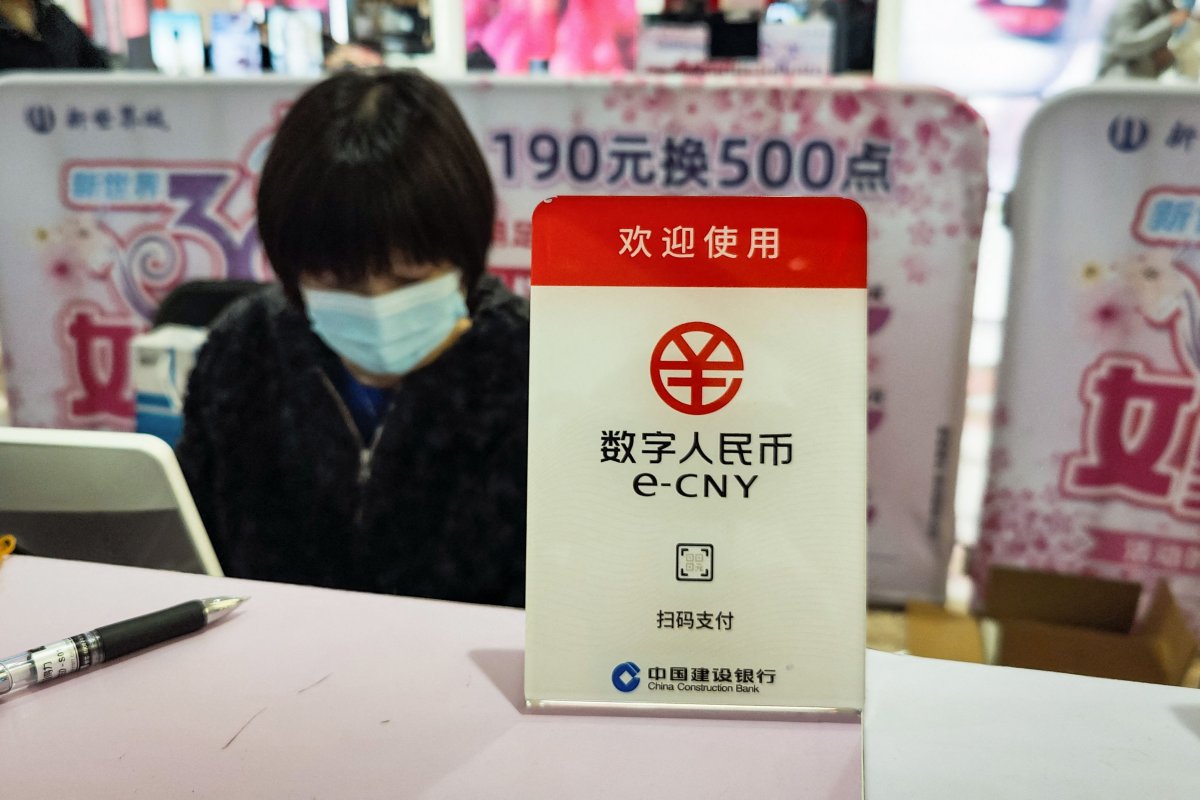🎙️ Voice is AI-generated. Inconsistencies may occur.
The world seems awash in cryptocurrency fever. Bitcoin prices have risen more than fivefold since the pandemic started, creating a wave of interest in digital assets. But this crypto-sideshow has been diverting our attention from the main issue—the fact that Beijing has spent the last eight years creating a digital version of the Yuan, and through it, seeks to control its citizenry, export digital authoritarianism and threaten the U.S. dollar as the world's reserve currency.
Central banks worldwide have been discussing digital currencies for several years, but few countries have been as singularly focused on the issue as China. Over the past decade, Chinese paper bills and coins have all but disappeared. They've surrendered to WeChat and Alipay QR codes on smartphones. The Chinese digital Yuan project—also referred to as the Digital Currency Electronic Payment—is the next iteration of this trend, and it's been years in the making.
Back in 2014, the People's Bank of China (PBoC) created a study group to analyze digital currencies, and it has been working diligently ever since—publishing dozens of patents, creating joint ventures with global financial institutions and conducting trials throughout China. The PBoC took full advantage of the coronavirus pandemic to push millions in digital Yuan into the hands of consumers prior to its official launch in cities like Shenzhen, Suzhou and Chengdu. China has developed hardware wallets to store digital Yuan, and a major state-owned bank conducted trials at two major Shanghai department stores. At this juncture, China's digital currency has moved rapidly past the pilot stage and seems set for a full national rollout.
Why does this matter? Because digital currencies represent a break from traditional systems. This is more profound than might appear at first glance. Physical cash is anonymous—it is a "bearer bond" instrument that allows for unmonitored transactions. Larger transactions are conducted through private entities like banks and payment networks like Visa or PayPal. While anonymous cash creates the potential for nefarious actors to exploit the system (the proverbial suitcase full of cash), there are important reasons to preserve this anonymity in the name of individual freedom. In the United States, this freedom is embodied in the Fourth Amendment's prohibitions against unreasonable search and seizure and the presumption of innocence. Digital currencies designed without anonymity-protecting features may appear seductive in fighting crime, but the unfortunate reality is that such tools would radically expand the ability of a government to peer into its citizens' everyday lives. And China's digital Yuan is designed to enhance government control, rather than protect individual freedoms.
It seems that Chinese President Xi Jinping envisions a transformed world order dominated by the PRC commercially, militarily and politically. The PBoC's rollout of the digital Yuan is only the latest in a series of steps meant to achieve that vision. China could become the first country to move to digital money, and by so doing would confer enormous power on the world's largest authoritarian government. We should expect that the Chinese Communist Party will use its digital currency to surveil all Chinese citizens' financial transactions, 24/7.

The digital Yuan will also help China enforce its "social credit" system, a database already in existence that monitors individual and corporate behavior in real time. Those who comply with Beijing's social credit system get rewarded. Those who don't get punished through travel limitations or getting barred from jobs or schools. Equally concerning is that China's digital currency architecture has the potential to be exported abroad to dictatorial regimes that similarly appreciate the role of digital money as an instrument of surveillance and control. The digital Yuan is as much a geopolitical weapon as it is a monetary tool.
The digital Yuan gives Beijing the offensive capability to challenge the U.S. dollar's dominance in cross-border payments. Since the end of WWII, the dollar has remained the global reserve currency. Almost all commodities, from iron to soybeans to oil, are priced in dollars. The Bank of International Settlements estimates that more than 80 percent of foreign exchange transactions are conducted using the greenback, compared to less than 4 percent for the Chinese Yuan. But Beijing is actively working to undermine the dollar's dominance.
Take the Society for Worldwide Interbank Financial Telecommunication (SWIFT), for example. SWIFT is the preeminent global network used by banks and other financial institutions to transfer money around the world. In recent years, a division of the PBoC created a joint venture with SWIFT that seeks to direct all cross-border Yuan payments through China's proprietary clearance and settlement system. Beijing has also been developing the "Multiple CBDC Bridge," a project initiated by the Hong Kong Monetary Authority and the Bank of Thailand to implement a cross-border payments system based on distributed ledger technology. Thailand was recently joined by the United Arab Emirates. More countries may follow.
Finally, China has been steadily promoting trade in Yuan along the "Belt and Road Network," an ambitious infrastructure program connecting China with more than 100 countries around the world. China's predatory lending policies in these countries provide it with a unique advantage. It isn't inconceivable that China could renegotiate its large loans to developing countries in Africa and Latin America in exchange for the settlement of commodities in digital Yuan instead of dollars. In short, evidence abounds that the ultimate goal of Chinese policy is to create a parallel payments network that slowly chips away at the dollar and elevates the digital Yuan on the world stage.
Aware of the development of China's digital Yuan, several members of Congress have expressed interest in the creation of a digital version of the U.S. dollar. Federal Reserve Chair Jerome Powell and Treasury Secretary Janet Yellen commented on the matter in hearings earlier this year. While stating that the U.S. was "looking very carefully" at the question of issuing a digital dollar, Powell emphasized that the U.S. wasn't in a hurry. "Because we're the world's principal reserve currency," he said, "we don't need to rush this project, and we don't need to be first to market."
It's an open question whether being the first to market a digital currency will be enough to win the Yuan global reserve currency status. Nevertheless, The main issue is clear. China is clearly leading the charge into a global digital economy. And it seeks to win. We should take heed.
Erik Bethel served as the U.S. Executive Director of the World Bank from 2017-2020. Bonnie Glick served as the Deputy Administrator/Chief Operating Officer of the U.S. Agency for International Development from 2019-2020. Both were unanimously confirmed for their roles by the U.S. Senate.
The views expressed in this article are the writer's own.



